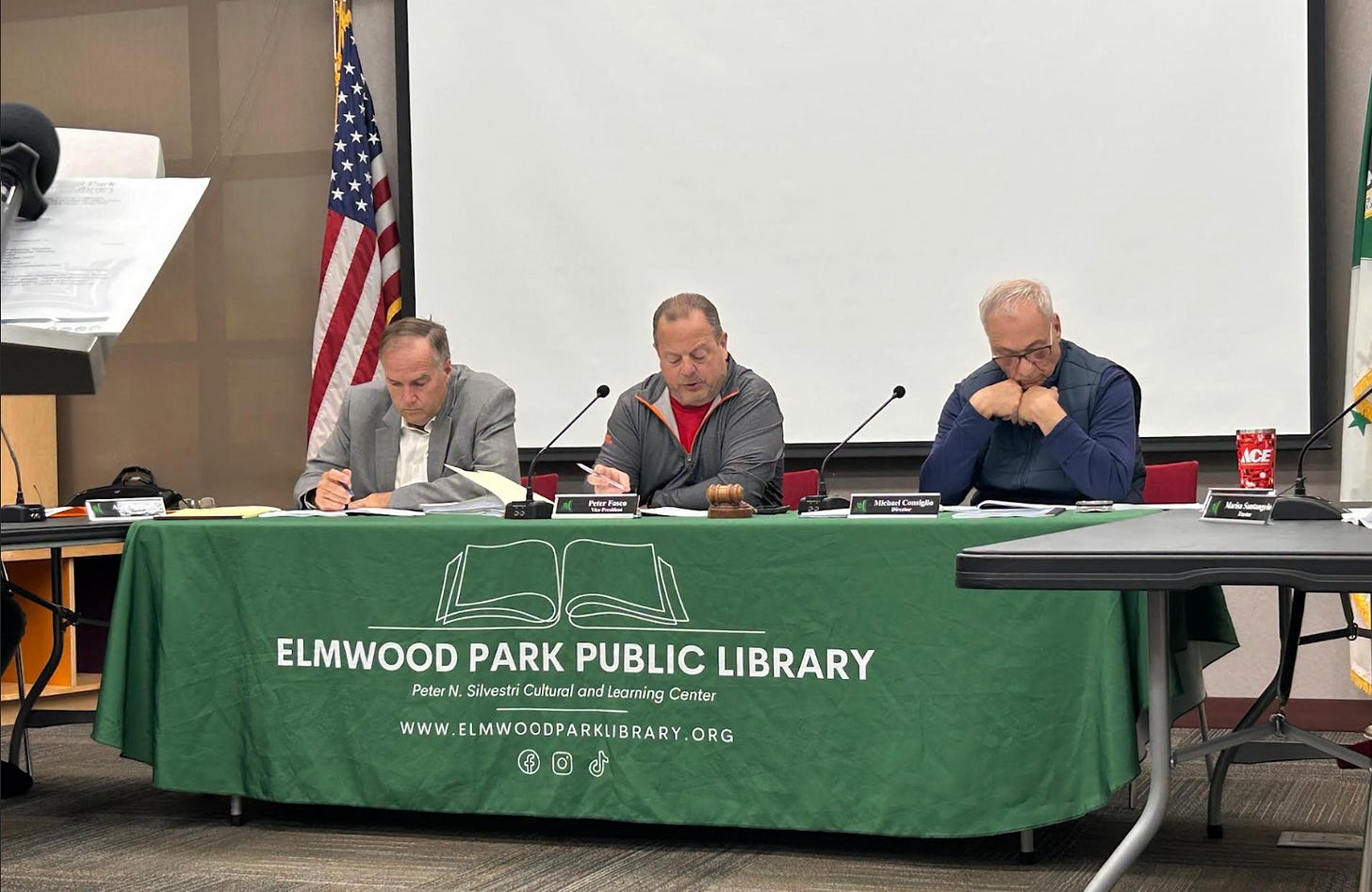Library Director Hides 'Legal' Justification For Charging Groups For Meeting Room Use

By Kevin Gosztola, Editor-In-Chief
Elmwood Park Public Library Director Michael Consiglio is hiding the “legal” justification for charging the Elmwood Park Advocate and other resident-led organizations for meeting room use.
On September 29, Consiglio informed the newsletter that attorneys with Klein, Thorpe & Jenkins had reviewed the library’s meeting room policy. The attorneys concluded that the newsletter must pay a $100 rental fee when reserving a meeting room.
Consiglio shared the “findings” with the Elmwood Park Advocate so that the community could clearly understand “how the policy applies to all groups.” However, after the newsletter submitted a records request under the Illinois Freedom of Information Act (FOIA), the library director denied the request.
In a denial letter from Klein, Thorpe & Jenkins, library attorney Thomas Melody claimed that the “request was specifically for a communication between a public body and its attorney, and that communication is privileged and exempt from disclosure. It would not be subject to discovery in litigation, and is protected by the attorney-client privilege.”
“It will not be produced because it is exempt and is attorney-client privileged material,” Melody added.
The Elmwood Park Advocate appealed the decision to the public access counselor of the Illinois Attorney General’s office, particularly because this is a document that has public interest value.
On November 10, the newsletter will go before the Library Board’s policy committee and the Library Board of Trustees to appeal the Library Director’s decision to charge $100 to use the meeting room.
The public should be able to read what was written in order to judge whether the library director is fully representing the attorneys’ conclusions. (After all, the library pays the attorneys with tax dollars from Elmwood Park residents.)
Also, the FOIA exemption for attorney-client privileged material is supposed to protect confidentiality between attorneys and clients. The library director waived that privilege when he disclosed the existence of an opinion by the library’s attorneys that supported charging the newsletter.
Consiglio notified the newsletter on July 24 that he had “formally submitted” the existing meeting room policy to the library’s “legal counsel for interpretation.” He mentioned he specifically asked the attorneys about “the fee structure and documentation standards applicable to nonprofit organizations. Their guidance will help ensure the policy remains transparent, fair, and enforceable.”
“I will contact you as soon as I receive a response from the attorney,” Consiglio later declared.
Three days later, Consiglio said, “I wanna see what their interpretation is before I charge you $100.”
But the library director’s commitment to transparency apparently ended when the Elmwood Park Advocate asked to see the “guidance” itself.
On September 13, Consiglio informed two Elmwood Park residents unaffiliated with the newsletter that he would “share the outcome” of the library attorneys’ review “publicly.”
The email, which notified the Elmwood Park Advocate on September 29 that it would be charged $100 for meeting room use, contained a great amount of detail. One would not expect the library director to share this type of guidance with them if it was “specifically for a [confidential] communication between a public body and its attorney.”
Consiglio indicated that the “attorneys emphasized that eligibility to meet is not the same as free use.” Only two types of organizations are “exempt from paying fees”—Elmwood Park government agencies and Elmwood Park-based organizations that are recognized by the IRS as 501c3 nonprofit organizations.
“This rule applies to all community clubs, cultural organizations, informal advocacy groups, and booster clubs that are not formally registered as nonprofits,” Consiglio added.
Presumably referring to the legal opinion, Consiglio stated, “The reason for this structure is apparent. The Library cannot make judgments about the value or neutrality of a group’s viewpoint without risking unconstitutional discrimination. By tying fee waivers only to verifiable nonprofit registration, the Library applies an objective and legally sound standard.”
The Elmwood Park Advocate has questioned this legal interpretation. Perhaps, that is why the library director—with support from Klein, Thorpe & Jenkins—refused to provide the newsletter with a copy of the legal opinion. He is concerned that the library would not be able to publicly defend the interpretation, or that it would fail to stand up to public scrutiny.
But it is recognized in Illinois state law that a “public body may not simply treat the words ‘attorney-client privilege’ or ‘legal advice’ as some talisman, the mere utterance of which magically casts a spell of secrecy over the document at issue.”
Melody claims that the legal opinion may be hidden from the public because the “work product” doctrine applies. Yet that is primarily intended to protect material prepared “for trial,” which may contain “theories, mental impressions, or litigation plans of the party’s attorney.”
The findings and recommendations, however, were not prepared for a lawsuit. They were drawn up to protect the library in the court of public opinion.
When Consiglio shared parts of the attorneys’ analysis with the Elmwood Park Advocate, the library waived its attorney-client privilege. It is unlawful for the library to continue to keep this opinion secret.
Not to mention, the library director has it all backward. Unincorporated resident-led groups or organizations should not have to pay a dime to use meeting room spaces.


Excellent reporting. Thank you.
This guy seems to have issues with you, have you tried talking to Skip about what is going on?